Meet the father and son paddling the length of the Mississippi to raise awareness for fellow veterans suffering from PTSD and depression.
They started in Minnesota, the pastor and the soldier, the father and the son, Jeff and Logan Hastings, both retired Army veterans. Snow still covered the ground as they put their kayaks into Minnesota’s Lake Itasca, the far northern end of the Mississipi River.
They call their trip Kayak for Veterans, and it will take them from the beginning of the Mississippi to the great river’s southern end in the Gulf of Mexico. Their mission? To raise money and awareness for fellow veterans struggling with substance abuse, post-traumatic stress disorder (PTSD), depression and suicidal thoughts.
Twenty-two veterans kill themselves every day, as often reported. Some newer research suggests that the number may be even higher, given the spike in death by suicide in veterans 18 to 24 years old. But another study, published in Annals of Epidemiology, suggests that for vets who fought in more recent wars, that number may be closer to one suicide per day. Regardless, half of those who served in Iraq and Afghanistan know a fellow vet who has either attempted or committed suicide. Both Logan and Jeff have personally known veterans who killed themselves.
When veterans need help, they should get it.
Somewhere in Minnesota, after paddling alone for days “in the middle of Nowheresville,” as Logan, the son, put it, his long-silent phone chirped. Logan shouted to his dad, Jeff, that his phone was blowing up. Usually the messages are from friends checking in or maybe Criss—Jeff’s wife and Logan’s mom—who is driving a motorhome ahead of the Hastings men on their current journey.
But this time was different.
Jeff had a voicemail from a woman he had never met. Her son, a veteran, was suicidal. So he went to work doing what he does best: listening to, caring for and ministering to veterans and their loved ones. The banks of the Mississippi in Nowheresville, Minnesota, was a strange place to take a call like that. But that’s the point of this 2,320-mile journey. When veterans need help, they should get it, no matter the circumstances.
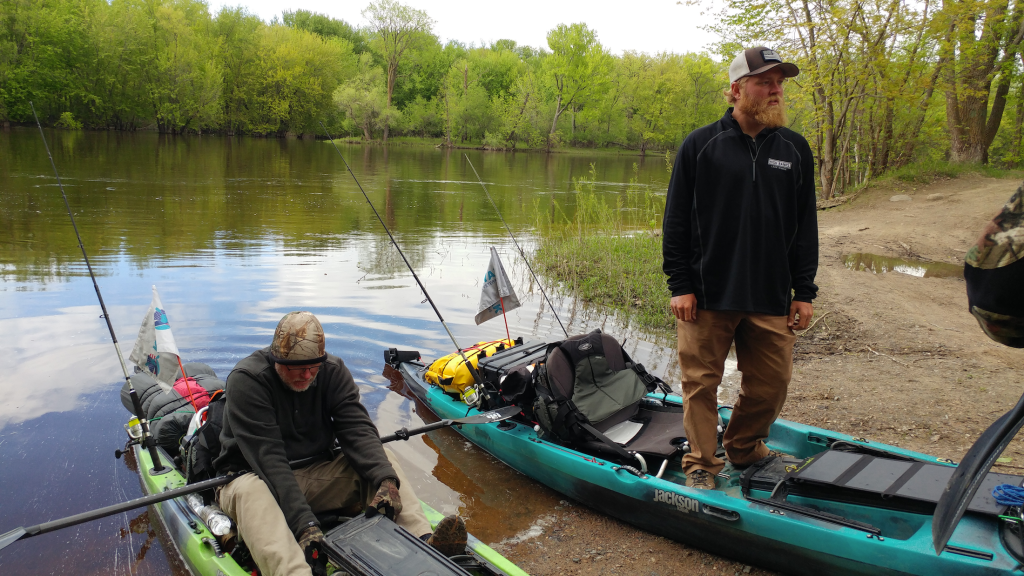
When I meet with the Hastings in late June, they are in their motorhome, which they named Lydia after a beloved prayer warrior (someone who prays a lot). Lydia is parked in the “campground” of a casino just across the Mississippi River from the St. Louis Arch, near the halfway point of their journey. I find Jeff, Criss and Logan inside on a rare day off.
My first impression is that they look the part. Jeff and Logan agreed not to shave for the duration of the trip, and Logan’s beard, which was already full when he started, has gone full Grizzly Adams. Jeff’s beard looks regal by comparison. Both are muscular and wear deep tans.
I first met the Hastings family five years ago when I wrote a story about their relationship with Minnesota Twins manager Ron Gardenhire. Gardenhire gave Logan one of his baseball gloves before Logan went to war in Afghanistan. Logan is a fan of the Twins the way the fish of the Mississippi are fans of the river, so the glove immediately became his most prized possession.
During his 2010 to 2011 deployment (his second, the first was 2007 to 2009), it was out of his reach only when he showered and went to the bathroom. It was even in the cab of his bulldozer with him on November 27, 2010, when he drove over an IED. Logan suffered head, neck and back injuries. The last time I talked to them, Jeff and Logan had just driven together from St. Louis to Minneapolis—roughly the same path of the Mississippi in the opposite direction—to return the glove to Gardenhire.
His best friend had died in his arms, and he suffered from PTSD.
After Logan returned from Afghanistan, he was hurting, physically and emotionally. His best friend had died in his arms, and he suffered from PTSD. He self-medicated with alcohol. “Drinking made the pain and memories go away,” he says. “But they’d come back when I’d stop drinking. So I would drink and drink and drink.”
He burned through his money and then started selling his possessions. He distanced himself from his family. He says he received a wake-up call when he was pulled over after he had been drinking. He’s reluctant to tell me this on-the-record but decides his honesty might help someone else. He was not ticketed, but he asked for help the next day.
He thought his friends, family and fellow soldiers would be angry with him but instead, they embraced him, applauded him, even, for asking for help. He checked into rehab and spent two months getting sober. Logan, who rose to the rank of sergeant, left the Army after rehab for medical reasons in 2014 and took a job as a truck driver.
“Not all wounds are visible.”
Jeff had spent his career as a pastor and chaplain, both in the Army and at hospitals. After leaving the Army Reserves as a captain in 2016, he said he felt God calling him to serve his fellow veterans, and he answered that call. He and Criss started a foundation called Warrior 180 with the slogan, “because not all wounds are visible.”
They sold their house in Kentucky, bought Lydia and now travel the country ministering to veterans in need. “We provide interventions for military veterans and their family members, whatever the issue is—be it depression, suicide, suicidal thoughts, drug and alcohol, marriage troubles,” Jeff says.
Sometimes that involves counseling, sometimes it involves being a resource of information and sometimes it involves connecting the person who needs help with local services.
Warrior 180 pays Criss and Jeff’s expenses, but they don’t draw a salary. Their long-term goal is to open a brick-and-mortar facility to give help to soldiers and their families who are struggling with PTSD, depression and suicidal thoughts. For now, they travel the country providing those services when the calls come in—even if they come when they’re in the middle of Nowheresville.
As of early July, their kayak trip had raised $3,500, a disappointing total, Jeff says. But he also believes that measuring this adventure only by that narrow number would be too reductive. Kayak for Veterans has raised awareness about the veteran’s mental health issues through interviews with TV, radio and print journalists up and down the river. A New York Times writer will paddle with them for a day or two in mid-July.
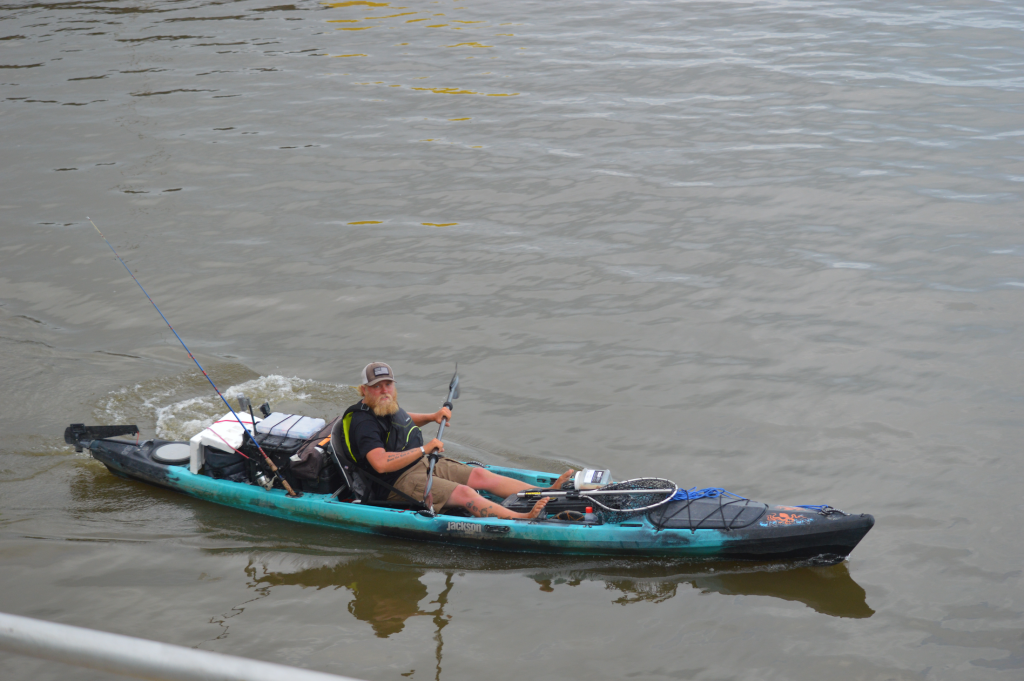
According to Big River Magazine, 34 groups started paddling at Lake Itasca in 2016, and 18 made it to the Gulf.
The idea to add their names to this year’s list was Logan’s. He and a truck driving buddy were going to do it, first just for fun. Then one of Logan’s closest Army friends killed himself, and Logan decided to turn the trip into a mission to raise money and awareness. Logan’s truck driving friend had to drop out about a month before the start, so Logan asked his dad to go with him instead.
Logan says he had never been in a kayak before this journey; Jeff had but only on leisurely day trips. Logan spent months researching the trip and what gear they’d need. The most important decision concerned the kayaks. He decided right away they should both have the same model so they would go roughly the same speed.
Because both of them injured their backs in the war, Logan’s number-one priority was comfort in the seat. The trip has long stretches with little contact with civilization, so he also wanted ample storage room. Given the size of the river and presence of barges, stability was another key factor. With those three concerns in mind—comfort, size and stability—he settled on the Jackson Kayak Kraken 15.5 model.
They like the comfort and size. But the Kraken is slow on the water and heavy during portaging. “You’ve got to give somewhere,” Logan says, “and we didn’t want to give on our backs. So we went with more weight, less speed and more comfort.”
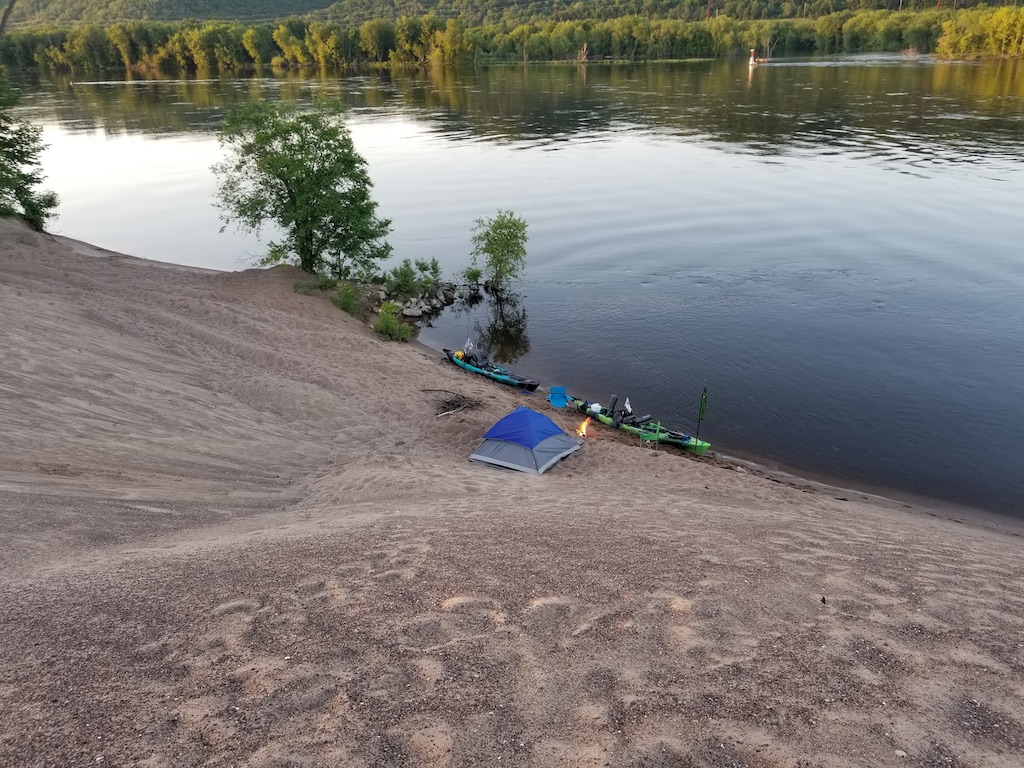
They don’t have a formal itinerary—the variables of wind, rain, heat and the current, not to mention calls like the one they got in Nowheresville—won’t allow it. They instead take the trip day by day. For the first half, they averaged about 40 miles per day; that increased to 50 after the Mississippi and the Missouri Rivers merged. They taped a map of the river to the back of one of Lydia’s chairs and mark their progress on that.
Jeff flipped in 39-degree water, passed out in the kayak from an electrolyte imbalance and had to go to the hospital after he wrenched his back.
Because of the pain their military brothers and sisters are going through, and the pain they have experienced themselves, Jeff and Logan wanted this trip to be hard. So far, it has been. Each has lost more than 25 pounds. Jeff flipped in 39-degree water, passed out in the kayak from an electrolyte imbalance and had to go to the hospital after he wrenched his back, aggravating an injury he suffered in Kuwait.
The biggest obstacle they have faced, both of them say, is extreme weather. It was cold up north. After they left St. Louis, the heat turned brutal and brought violent storms with it. The worst one hit as they approached Memphis. “By the time we paddled across the river to this island, it was down pouring. The lightning was right on top of us. It was hitting the Mississippi right there next to us,” Logan says. “The island we happened to be on is pure mud. We’re sunk to our knees deep. We can’t set a tent up there. So we’re hugging a tree trying to stay out of the mud and not get hit by lightning. I can officially say I did not like that.”
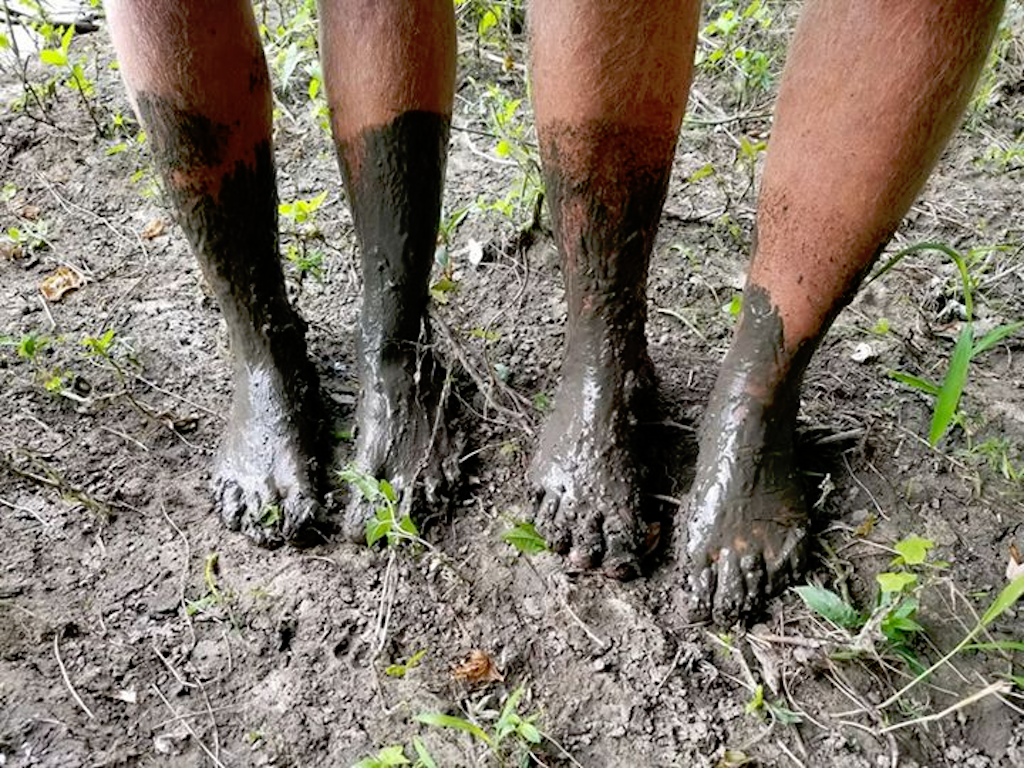
But there have been moments of indelible beauty, too. They’ve seen swimming deer, gamboling bears and soaring eagles too numerous to count. They fished often early in the trip and feasted on northern pike, catfish and crappie. Strangers have cooked them steak dinner, given them a place to sleep indoors and forked over money for the cause.
But most of the time it’s just the two of them, the river and the miles in front of them, miles that seem to be endless even as they are dwindling. They wonder how many times they’ve mindlessly started counting their strokes. One day, Logan suddenly shouted, “ONE THOUSAND” and then coasted for a second to give his arms a break.
Whenever it gets bad, whenever they want to quit, they think about the friends they have lost. They think about phone calls like the one Jeff got in Minnesota. They know their journey down the Mississippi, as hard as it has been, has a definitive end 100 miles south of New Orleans.
“That’s when I think about folks who are right now at their worst, thinking there is no hope, thinking there is no way out, the troubles are too big,” Jeff says as he sits up straight on the couch in Lydia.
He looks down at a giant glass vase of pennies by his feet. Criss has put 22 pennies in it every day to commemorate the 22 veterans who commit suicide every day. “That’s 22 dads and 22 sons and 22 brothers and 22 sisters. That’s uncalled for,” Jeff says.
“One is too many,” Logan says.
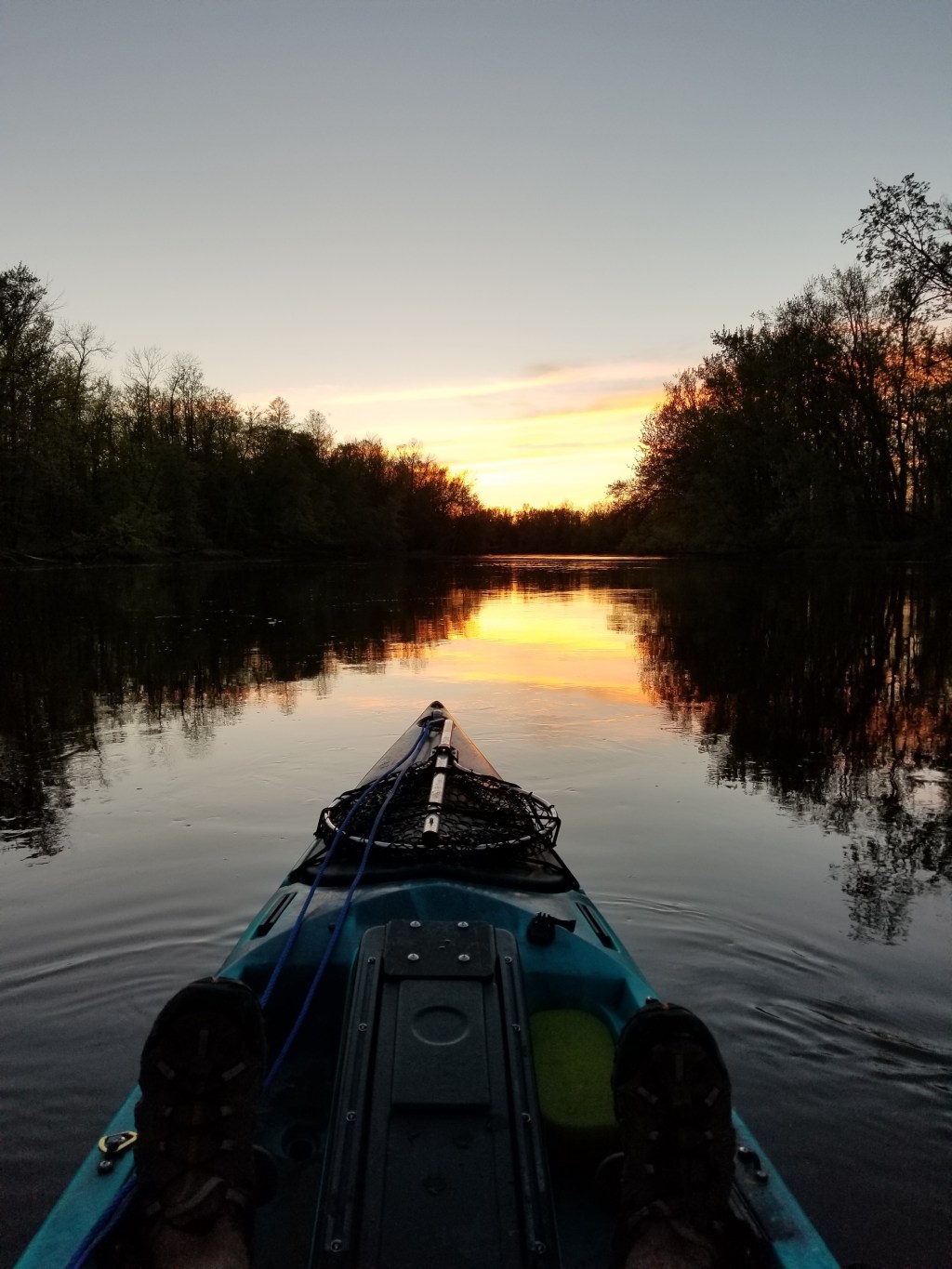
It’s five days after I met the Hastings family in St. Louis, so they are five days closer to the Gulf of Mexico. But on days like this, the solutions they seek seem as far away as ever, and Jeff’s dream of a brick-and-mortar facility to give veterans solace can’t come true soon enough.
Jeff sits in his kayak. Talking into his phone on Facebook Live, he chokes out the news: “I just got one of those phone calls that you don’t want to get,” he says.
Another soldier gone by suicide.
All the deaths he encounters hit close to home, but this one even more so. Jeff worked with this soldier’s sister and had spoken to him directly. “The stories I hear about him are incredible. What a great man, soldier, father and husband. But when he came home, he was different. He was changed. He couldn’t get the help he needed.”
The Mississippi drifts slowly behind him as Jeff continues. “These young men and young women need help. They are changed. They’re changed forever,” he says. “I’m begging you to connect with the life of a veteran. Don’t let these folks be alone. Help them.”
For more information, visit Warrior 180 Foundation and Kayak for Veterans.
